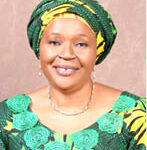By Ijeoma Okereke-Adagba
Stephanie Adejo, 29, lost her job at Topland Consults, a Lagos-based marketing firm that downsized to cut cost in May 2020. A few months later, her tech journey started.
“After I was laid off, I was frustrated for months. I literally fell sick. Then my friend introduced me to data analysis during the lockdown,” Miss Adejo, who now earns three times the pay in her previous role as an administrative officer said.
Despite being ‘fulfilling and financially rewarding,’ Miss Adejo said there was a gender gap in Nigeria’s tech industry.
“There are just few of us (women) in the system. It is practically dominated by men, as you will notice in many workspaces,” she said.
Not-too-encouraging reality
There are not as many women as men in Nigeria’s rapidly growing tech ecosystem. According to the Nigerian Bureau of Statistics (NBS), the likes of Miss Adejo and other women make up only 22 per cent of the country’s total number of Science, Technology, Engineering and Mathematics (STEM) university graduates and not all of them transition into tech.
According to a research by the African academy of sciences, multiple factors, including policy issues, institutional barriers and individual challenges, contribute to the existing inequalities and underrepresentation of women in STEM.
Out of the 396 respondents surveyed in the research, 61.1 per cent of women’s personal capabilities influenced them to take up a STEM career, 26 per cent were influenced by their parents, academic preparation 26 per cent, and women role models (24%) contributed to the choices women make to pursue STEM-related careers.
In comparison, 76 per cent of women were attracted to a STEM career because it fit their capability. The need for higher salaries (16.5%) or job security (24.2%) did not seem to feature as the main attractions to STEM.
However, there were qualitative views suggesting remuneration in terms of financial benefits as one reason they were motivated to pursue STEM courses. For instance, there were only five females in Onoriode Dafetta’s Industrial Engineering class at the University of Benin. Today, she is a Frontend and Power Platform Developer at Reliance Infosystems
“I think it is more about passion than the course you studied,” Miss Dafetta said.
Low remuneration
Women have been described as an integral part of the global tech ecosystem but are constantly excluded by a myriad of factors, including cultural barriers, scarce digital skills, lack of internet access and the male-dominated workspaces. Much of this has also been linked to low funding for women in the tech sector.
Between 2013 and 2021, African tech startups received $12.6 billion in funding, but women-led firms accounted for less than 5 per cent of this, against the 82 per cent cooped by their male counterparts. (82 plus 5 is not 100 – the 13 per cent is for startups that are jointly owned by men and women)
Shola Akinpelu, cofounder of HerVest, a platform that provides financial services to African women, said women were also subjected to underpaid roles within the tech ecosystem. Miss Akinpelu, whose firm provides financial inclusion for women, said the global tech industry lost about $160 trillion annually to this disparity.
She noted that measures had been put in place to improve access for Nigerian women in tech, but said this was set back by the impact of COVID-19.
“Before COVID, we were at 102 years in closing the total gender gap, but now, it stands at 136 years,” Miss Akinpelu told participants at a digital conference in Lagos.
The World Economic Forum (WEF) ranked Nigeria 139th out of 156 countries in its 2021 Global Gender Gap Report released in March, dropping 11 places from its position in 2020.
The report noted that only 67.2 per cent of the overall gender gap in sub-Saharan Africa had been closed, leaving a deficit of 32.7 per cent. It noted that at such a slow pace, it would take 121.7 years to close the gender gap.
Out of the 35 countries in the sub-region, Nigeria was ranked just above Chad (148), Mali (149) and the Democratic Republic of Congo (151). With Nigeria’s gender gap index at 62.7 per cent, only 49.3 per cent of women are in the workplace, likewise other sectors. For instance, Nigeria has only achieved 4.7 per cent of the political empowerment gender gap as the country has never had a female president. Also, only 13.9 per cent of firms in Nigeria have women as leaders.
Rising above challenges
Despite these challenges, Nigerian women are rising above barriers in the tech space. Temitope Omotolani’s FarmCrowdy is digitising Nigeria’s agricultural sector, improving food security while helping investors and farmers across the country gain revenue. She is also a cofounder at Crowdyvest, a platform that has raised over $35 million through savings and investment for multiple businesses.
The only Nigerian woman on the 2019 edition of the Forbes 30 under 30, Tito Ovia, is passionate about improving the quality of health care in Africa with Helium Health, a health care platform used by over 5,000 doctors and 500,000 patients across West Africa.
Secure ID, founded by Kofo Akinkugbe, is a market leader in smart card technology and digital security, fully verified by VISA, Verve and MasterCard. It also owns the only smart card production plant in West Africa.
Dana Kohut, the founder of The Prime View, a platform for sharing experiences about digital innovation and technology from experts in business and technology, noted in Forbes, 2022 that very few women became ‘newsmakers’ in the field of technology and journalism.
Women working for technology companies and startups lack visibility and representation in the media, whether it is print, online or television. The Global Media Monitoring report of 2021 noted that only 25 per cent of women were news subjects in different story topics, such as print, television and radio news in science, technology, research, funding, discoveries and development.
Key findings from the report show that 19 per cent of topics speak about gender equality in the African region, which is highest when compared to Asia and the Middle East at 1 per cent.
Empowerment is the way
From Moyinoluwa Adeyemi, a software engineer at Twitter, to Dr Funmi Adeware of MobiHealth, Tope Omotolani of FarmCrowdy, Keturah Ovio of Limestart and ’Bamboos Yanmo Omorogbe, Nigerian women are changing the status quo and inspiring others to success in tech.
Numerous initiatives are also improving access to opportunities for women within the tech ecosystem, including skills training, mentorship and job placements.
Over 1,000 women were trained on digital skills in 2021 by Ingressive for Good. Another 1,000 women will participate in this year’s edition, as they aim to gain placements in the region’s fast-rising tech industry.
“We want to empower women with the skills they need so they can confidently take up roles in tech. It is not a one-time activity, it is something to which we are committed,” Blessing Abeng, cofounder of Ingressive for Good said.
In 2021, over 1,820 women and girls in Lagos were trained in technology programmes by the Women’s Technology Empowerment Centre (W.TEC). The centre had previously trained female participants in Nasarawa, Bauchi and Abuja during the pandemic.
They were trained on electronics and renewable energy panel projects. Likewise, hundreds of girls and women in Uyo, Akwa Ibom State, have benefitted from the annual all-female tech skills workshop organised by the Roothub, a tech and innovation lab. Participants learn graphics design, UI/UX, content writing and coding.
Another initiative, TechHer, facilitates the economic and political empowerment of women through technology and information access. It provides a community and opportunities to help women create new connections, network to learn from others and explore careers in tech.
What the government is doing
On its part, the Nigerian government has also shown some commitment to providing women with the necessary skills and tools to participate in the digital economy in line with the national ICT Policy and the Digital Economy Policy and Strategy. This is in line with section 7.4.3 (x) of the ICT policy, which seeks to promote ICT awareness and proficiency in mass and non-formal education, especially for women, children, youth and the physically challenged.
Between 2019 and 2022, the National Information Technology Development Agency (NITDA) organised specialised training for 100 women and girls in each of the six geopolitical zones, with the aim of closing the gender digital divide, promoting job creation and financial inclusion.
“Toward the realisation of these objectives, the NITDA, in our efforts at assessing and addressing ICT skills requirements, will support sustainable economic growth, development strides and develop this unique training programme targeting women,” Hadiza Umar, NITDA head of Corporate Affairs, said.
The most recent of these training was a four-day capacity building organised in January 2022, for 60 Women on ICT Technopreneurship in Dutse, Jigawa State, North West, Nigeria.
What next?
As these initiatives and many more strive to create opportunities for women in the tech sector, there have been calls for more female-focused activities and awareness of the importance of computer literacy and acquiring tech skills by more women in society.
“We need to spread the word and educate more women on the numerous opportunities in tech, not just adults but young girls. We need to catch them young and have more girls involved in tech,” Stephanie said.
To close the gender gap in Nigeria’s tech ecosystem, Miss Defetta believes women need to own and hone their crafts despite challenges or perceived male dominance in tech workspaces. Nevertheless, despite the small gains in technology that women are celebrating, a lot has to be done on the corporate ladder most, especially for women of colour.
“No matter your gender, put in the work. Users hardly know the gender of the developer of a website,” she said
This story was supported by Code for Africa’s WanaData initiative and the World Association for Christian Communication.

 Join Daily Trust WhatsApp Community For Quick Access To News and Happenings Around You.
Join Daily Trust WhatsApp Community For Quick Access To News and Happenings Around You.


